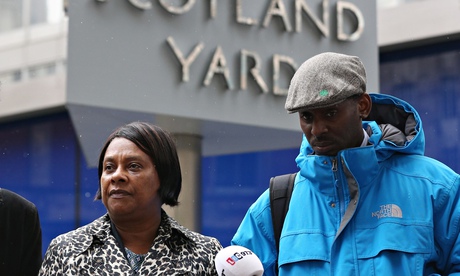Undercover police officers secretly gathered intelligence over two decades on 18 families fighting to get justice from the police, it was revealed on Thursday.
The intelligence covering high-profile campaigns was collected between the mid-1980s and 2005, and affected grieving families whose relatives had been murdered or had died in police custody.
In a critical report, police chiefs admitted that undercover officers collected intelligence about funerals, disagreements among campaigns and protests being organised by the families.
One reference was to an unnamed individual planning to go to a funeral, even though "there was no intelligence to indicate that the funeral would have been anything other than a dignified event".
Relatives of the Brazilian Jean Charles de Menezes are already considering legal action against Scotland Yard after they were told that information about their justice campaign was found in the secret records. The Brazilian electrician was shot dead by police in 2005 after being mistaken for a bombing suspect in the aftermath of the 7 July attack onLondon.
Information was also recorded on the relatives of Cherry Groce, whose shooting by police in 1985 sparked the Brixton riots; Stephen Lawrence, who was murdered by racists in 1993; and Ricky Reel, who died in mysterious circumstances in 1997.
The campaigns for justice for Harry Stanley, an unarmed man shot dead by police, and Wayne Douglas, whose death in custody triggered riots, were also under police surveillance.
Stanley was shot dead in Hackney, east London, in 1999 after police mistook a table leg he was carrying in a blue plastic bag for a shotgun. An inquest jury later found he was unlawfully killed.
Douglas died in December 1995 at Brixton police station, south London, after being restrained. Riots broke out after his death, which an inquest found was accidental.
On Thursday, Mick Creedon, the Derbyshire chief constable running an internal investigation known as Operation Herne into the Special Demonstration Squad, heavily criticised Scotland Yard for collecting and wrongly retaining information about the familes in secret files.
He painted a picture of an "isolated and insular" undercover unit that operated in complete secrecy, and branded the management of the undercover officers "complacent and possibly negligent".
He said: "I cannot justify the way this information was subsequently handled. Quite simply put, unless the information could have prevented crime or disorder, it should not have been retained and certainly not for the period it has been.
"I can understand why this is likely to be distressing and astonishing for those families and friends who campaigned, often for years, for justice; to know that details of your deceased or innocent family member and your campaign was mentioned in reports stored – often stored for years – in special branch records. This must seem inexplicable."
In his report, he said: "Over the 40 years that the unit existed, senior Metropolitan police management of the day either knew nothing about the existence and activities of the unit or, when they did, they appeared to have allowed the SDS to exist in secret isolation in a manner that was complacent and possibly negligent."
Undercover officers did not use notebooks, and hoovered up and passed on information wholesale to bosses that was then kept in its entirety, he added.
"The practice of the mass collection and retention of knowledge identified by Operation Herne undoubtedly begs the question: why report, record and retain this information if it provided no operational benefit in targeting crime or preventing disorder and if it was not disseminated outside special branch for any operational or investigative purpose?"
The investigators have spoken to a number of former SDS officers, who said they received no training in terms of "collateral intrusion", which protects private information.
Creedon went on: "Ultimately the Metropolitan police service failed in not working to the nationally accepted Home Office guidelines on the workings of special branch.
"Had they done so, this activity may well not have taken place, the intelligence would not have been recorded and, if it had been, it would have been rapidly weeded as it did not relate either directly or indirectly to the discharge of special branch functions."
Creedon said the scale of the retention of the documents kept by the unit was staggering, and it was an "irony" that if it had stuck to the rules no evidence of wrongdoing would have remained.
Creedon's report was published following revelations by the whistleblower, Peter Francis, an undercover SDS officer who infiltrated anti-racist groups between 1993 and 1997. He had said that his superiors asked him to collect intelligence on the so-called "black justice campaigns", which were seeking justice for mostly black or Asian men who died either in custody or after contact with police.
Many of the campaigns were led by grieving relatives, although political groups campaigned alongside them.

You need to be a member of 12160 Social Network to add comments!
Join 12160 Social Network